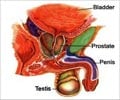A common group of alpha-blockers prescribed to treat pelvic pain in men proved ineffective by researchers of Queen’s University and a urologist at Kingston General Hospital.
Alfuzosin, a drug which is commonly prescribed by doctors treating men suffering from a painful pelvic condition, has been found to be ineffective in an international study.
“The results of our study will inform not only future clinical trials of alpha-blockers, but also other potential therapies,” New England Journal of Medicine quoted lead researcher Dr. Curtis Nickel, a professor at Queen’s University and a urologist at Kingston General Hospital, as saying.“Although the evidence for using alpha-blockers to treat new cases of chronic prostatitis/chronic pelvic pain syndrome is weak, some physicians have advocated use of this class of drug in men with this condition. Our findings do not support this recommendation and should prompt reconsideration of use of an alpha-blocker as the first drug of choice for these patients,” he added.
Men suffering from chronic pelvic pain syndrome often experience pain in the genital and urinary tract area, and also report lower urinary tract symptoms and sexual problems that negatively affect their quality of life.
Sponsored by the U.S. National Institute of Diabetes and Digestive and Kidney Diseases (NIDDK), part of the National Institutes of Health, the study involved 233 men who had been diagnosed with chronic prostatitis/chronic pelvic pain syndrome.
The subjects were randomly assigned to either alfuzosin or an identical-looking placebo. None of the men had received prior treatment with a beta-blocker.
Over the 12-week trial, the researchers asked the subjects to rate improvements in pain perception, problems with urination, and their quality of life.
Advertisement
“In medical research, it is as important to find out which treatments are effective, as well as those which are not beneficial. Now researchers can focus their efforts on more promising therapies,” said NIDDK Director Griffin Rodgers.
Advertisement
Source-ANI
PRI/SK














